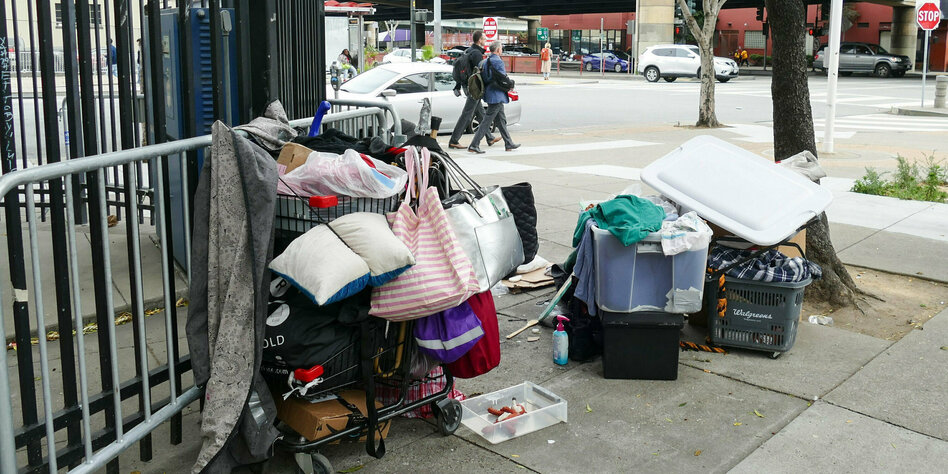Sociologist Matthew Desmond explores America's poverty in his book. 38 million people there cannot meet their basic needs.
Homeless in San Francisco Photo: Barbara Munger
Since 2012, no gangster film has been as firmly set in the period as Andrew Dominick's “Killing Them Softly.” The film ends on August 28, 2008, with the Democratic presidential nominee being nominated. With his inaugural speech on 4 November. The focus is on Jackie Cogan, a sophisticated contract killer played by Brad Pitt who has to “cleanse” the Mafia.
At the end of the film he sits at a bar counter with his client. It is about his salary. Obama can be heard on the television in the background. Snippets of words about the American dream, freedom and equality for all are heard.
Jackie can't take Obama's pity anymore: “This guy wants me to believe we live in a society? I'm not laughing! I live in America and you are alone in America. America is not a country, America is a business. Now you're paying me!”
American sociologist Matthew Desmond uses a somewhat more polished approach to describe the dire situation the country has been in for years. But he makes America's position harsher: “This is America: the richest country in the world, but with more poverty than any other democracy.” ”. Now available in German translation and, ironically, on Barack Obama's 2023 reading list.
38 million
In the prologue, Desmond immediately explains the blatant injustice of the country. 38 million people cannot meet their basic needs. More than a million school-age children are homeless. After starting prison, inmates notice that their health improves as they are worse outside than inside.
Matthew Desmond: “Poverty. An American Disaster.” Rowohlt Verlag, Hamburg 2024, 304 pages, 20 euros
How can such poverty exist in a country whose GDP is greater than that of Japan, Germany, Great Britain, India, France and Italy? Matthew Desmond, a sociologist at Princeton University, wants to investigate this.
Because, he writes, countless books have dealt with the nature of poverty, but none of them have answered the question of why it exists. He calls for a change in perspective: “Those who live prosperously must look to us.”
A frequent explanation given by the left for the causes of poverty is “neoliberalism”. However, Desmond's data speaks against this: “He left no mark on the national budget, at least not on the fight against poverty. There is no sign that America has become more miserly.
Poverty persists because some people want it that way.
Although social spending has continued to rise over the years, the money is used for all kinds of projects that have nothing to do with fighting poverty or that only benefit the non-poor: “Not much money is spent. The poor are freed from poverty, but rather in securing wealth for the rich.”
“Because some people like it”
“Poverty persists,” writes Desmond, “because some people want it that way.” Only 10 percent of employees are unionized.
Added to this is the concentrated power of corporations, particularly those in the gig economy, who use their influence to continue to undermine occupational safety laws. Meta, Amazon and Comcast spend more money on their lobbying work than all unions combined.
Or massive tax evasion by global corporations: the US government loses a trillion dollars every year. According to Desmond's calculations, the government would need to spend $177 billion to eradicate poverty. That's less than 1 percent of GDP and “less than the value of the food Americans throw away each year.”
Reform of the welfare state
In the face of this politically motivated insanity, his solutions are pretty innocuous. Or realistic. Because you can only implement measures that have broad support, he insists: “I demand that only the rich pay their taxes. I demand an overhaul of our welfare state. I demand that America invest in the common good as it has in the past. I demand more support for the poor and less support for the rich.
Until it is, America will remain just that: an American disaster.










More Stories
Nicolas Loufrani: Young Londoners Design Afro Hair Emojis
US Election: Trump Vs. Harris – 2024 poll numbers in America
Börse Express – USA: Retail sales rise unexpectedly